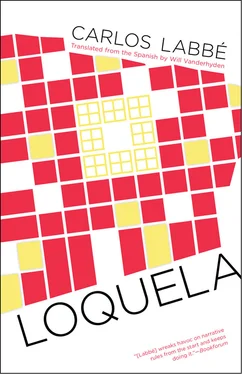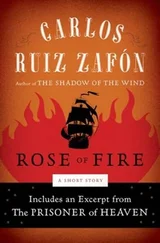He Who Is Writing the Novel squeezed my hand, looked at me from the podium, cleared his throat, ran a finger through his hair, tugged at the collar of his shirt, handed the microphone to another boy just like him who was going to introduce me to the public; through the window I watched He Who Is Writing the Novel sitting on the quad: in the end he hadn’t come into the auditorium; literary magazine, fuck that, I thought. Then, timidly, he lifted one hand, waving to me. And I didn’t like that an albino girl sitting next to me noticed our exchange, our broken intimacy; that she moved her eyebrows in response to his wave. He Who Is Writing the Novel thanked the audience for their interest, squeezed my hand, cleared his throat on my apartment terrace as the wind whipped the trees that night. Good afternoon, thank you for coming. He gave the microphone to another just like him, a boy who is also writing the novel, who also squeezed me, who thanked the audience, looked out at them, and said: all of you have come to the presentation of the third edition of the magazine Suspensión , but I have to be honest with you: there is no magazine, the magazine has ended. The magazine is dead, because paper is dead vegetal carcasses, and so is literature. The lights were low now, the perplexed albino features of all those faces of mine, pressed against the glasses of water and the windows of the auditorium. It was night. The wind came in forcefully from the sea and the curtains of my apartment were out of control. He Who Is Writing the Novel took my face between his hands, kissed me, and said that he wanted to sleep with me, that he wanted my body; I kicked him in the ankle and he let me go. He Who Is Writing the Novel proclaimed the existence of Corporalism; the multitude moved furiously from the university to the street, one boy wanted to hit him, from all directions people called him a pretentious asshole, the Breton of porn, a man tried to grab me around the waist, another took my hand and wouldn’t let go. One went so far as to follow me home. First they threw a beer bottle from the back of the room, then came the shattering of wine glasses like a storm on the Neutria pier. They called us ignoramuses, intellectuals, imbeciles: that Corporalist mafia just wants publicity, to attract some big publisher, and indeed after a few days we received a call from a widely circulated newspaper that wanted to interview us. The auditorium was silent. Sad, He Who Is Writing the Novel got to his feet, went to the door of the auditorium, left the university, walked to my house, buzzed the intercom, told me that he wanted to talk about the novel that was keeping him from sleep. I, on the other hand, slept deeply against his chest while he ran his fingertips along the nape of my neck and murmured that I should sleep in peace, that this too is written in the only work of Corporalism.
The novel had fifteen chapters — one per month for one year and the following summer — detailing the actions he would take along the path that led from the writing itself to the founding of Corporalism, from the public declaration of the end of literature to the confusion of character, writing, and author. He Who Is Writing the Novel put both hands on my back and let them slide slowly down. We went to my room; he entered and I stayed in the doorway watching him get into my bed, waiting for the groan of the mattress to stop and transform into a moan, into foam, into the sound of a great deal of water filling an immense space that is the ocean and that comes in through the open window of my apartment in Neutria. The same sound that I can no longer hear through the car horns, the house alarms, the TVs, and the screams of no one: the sound of a dead body that climbs out of bed and settles on top of another dead body, just so, with that nighttime silence so necessary for sleep.
Carlos had spent that Sunday at his uncle’s place, where the whole family had gotten together for a cookout so they could check out his uncle’s new property. The sun was setting by the time he went home. The heat was beginning to descend both in the country and in Santiago, but his bedroom, the living room, and the bathroom were cold like always, far from the summer sun. He closed the door. In the hallway there was a leather suitcase; on top of it, an affectionate note indicating that someone would be by that night to pick it up. The paper was signed by his cosmopolitan cousin Alicia. Carlos left the message where it was, he stood still for a moment, sneezed. He removed a tissue from his pocket and blew his nose. He remembered that he should bundle up or he’d catch a cold, that warning he heard in his mother’s voice and also in Elisa’s every time they heard him sneeze. He went to his room to grab a sweatshirt. In the living room he turned on the standing lamp so he could find the answering machine. There was a message: someone complaining about her terrible memory, asking him to remind her about a trip they had coming up, and to call her. It was the voice of a woman. Carlos’s first impression was that it was Elisa, he recognized that deep sleepy voice she spoke with sometimes, but he had no idea what she could’ve been referring to: during the last few weeks they’d scarcely exchanged a word, they saw each other once at a mutual friend’s birthday party and ended up in bed, drunk. But they didn’t converse.
He listened to the message again. Elisa always signed off her messages by leaving her name in order to avoid any confusion, because her voice changed: it was like a shrill little girl’s when she was happy, like an adolescent’s when she had a bad cold or when she was just waking up, like a very thin piece of glass when she wanted to hide something painful. It wasn’t Elisa talking, but it sounded so similar; it was just like Elisa’s voice, Alicia had commented after reading the paragraph from his novel in which the protagonist tells a man in a bar everything he knows about the albino girl and describes her voice. That day his cousin told him that his female characters would never speak differently than Elisa, because he never listened to anyone else. Carlos defended himself by saying that was how he preferred it, that all the men have his face, that all the women be slight and distant like his girlfriend. Why lie: in those two-hundred-and-some-odd pages there was no city other than the one in which he lived, no one else walking its streets but the two of them, though they were disguised consecutively as detective, as killer, as writer, as albino girl, as beggar, as old woman. He couldn’t keep a paralysis from descending from his head to his hand every day that, ready to move forward on some chapter, he sat down in front of the notebook; this should’ve been resolved when Elisa denied, with a scornful gesture, that there existed any resemblance between her and the albino girl in his novel. And yet when the protagonist tried to listen to the conversations between that albino girl, the professor, and another man, deducing their words from the movement of their mouths through the window pane, hiding between the trees on the plaza, walking anonymous through the foggy nighttime port, it was the voice of Elisa that he inserted into the discussion instead of the girl. And although he would never hear the albino girl, except her final moan, which she’d utter bleeding on the floor, the protagonist spent days describing a particular emphasis in Elisa’s voice. Carlos was still leaning on the small table by the telephone, attempting to reproduce her pronunciation, without any luck. He dialed the number on the answering machine. Hello, he said, is Violeta there? An old woman, half-asleep, muttered that she wasn’t there, that she’d gone traveling. He hung up. He sat on the couch, watching the day slowly break. Maybe his cousin and Violeta were going on a trip together, maybe it was a wrong number and the old woman on the other end of the line had been confused. He stared at the leather suitcase in the hallway: someone would come by that night to pick it up. The telephone was ringing, he froze. Hello, he said when he managed to pick it up. It was the same voice that made him nervous, the only one he heard. What’s up, how’s everything going, was he busy right then. He exhaled. Elisa asked him why his voice sounded so strange, if she’d woken him, and he responded that he was happy to hear from her, that he wanted to see her.
Читать дальше












